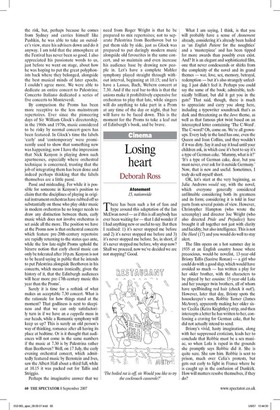Losing heart
Deborah Ross Atonement 15, nationwide rr here has been such a lot of fuss and hype around this adaptation of the Ian McEwan novel — as if this is all anybody has ever been waiting for — that I did wonder if I had anything new or useful to say. But then I realised: 1) it's never stopped me before and 2) it's never stopped me before and 3) it's never stopped me before. So, in short, if it's never stopped me before, why stop now? Shall we proceed, now we've decided we are not stopping? Good.
What I am saying, I think, is that you will probably have a sense of Atonement already, considering it's already been hailed as 'an English Patient for the noughties' and a 'masterpiece' and has been tipped for more awards than possibly even exist. And? It is an elegant and sophisticated film, one that never condescends or shirks from the complexity of the novel and its grand themes — war, love, sex, memory, betrayal, redemption — but it's also strangely unfeeling. I just didn't feel it. Perhaps you could say the same of the book; admirable, technically brilliant, but did it get you in the guts? That said, though, there is much to appreciate and carry you along here, including a typewriter soundtrack that's as dark and threatening as the Jaws theme, as well as that famous plot twist based on an intercepted letter containing 'The C-Word'. The C-word? Oh, come on. We're all grownups. Every lady in the land has one, even the Queen and Joan Collins, and they wouldn't if it was dirty. Say it and say it loud until your children ask, in which case it's best to say it's a type of German cake. 'Mummy, what is it?' 'It's a type of German cake, dear, but you must never, ever ask for it outside Germany.' Now, that is new and useful. Sometimes, I truly do sell myself short.
OK, let's start at the very beginning, as Julie Andrews would say, with the novel, which everyone generally considered unfilmable considering both its greatness and its form; considering it is told in four parts from several points of view. However, Christopher Hampton (who wrote the screenplay) and director Joe Wright (who also directed Pride and Prejudice) have brought it all together not just with clarity and lucidity, but also intelligence. This is not Die Hard (17) and you would do well to stay alert.
The film opens on a hot summer day in 1935 at an English country house where precocious, would-be novelist, 13-year-old Briony Tallis (Saoirse Ronan) — a girl who could do with a good slap, which would have avoided so much — has written a play for her older brother, with the characters to be played by her cousins: 15-year-old Lola and her younger twin brothers, all of whom have spellbinding red hair (check it out!). However, later that day, Briony spots the housekeeper's son, Robbie Turner (James McAvoy), apparently making her older sister Cecilia (Keira Knightley) strip, and then intercepts a letter he has written to her, confessing a craving for German cake, that he did not actually intend to send.
Briony's vivid, hasty imagination, along with her suppressed eroticism, leads her to conclude that Robbie must be a sex maniac, so when Lola is raped in the grounds she promptly says Robbie did it. She is quite sure. She saw him Robbie is sent to prison, much over Celia's protests, but gets out early to fight in France where he is caught up in the confusion of Dunkirk. How will matters resolve themselves, if they do?
This is a film of great power but I could not find its heart which, I admit, may be my own limitation. I don't think it's the actors' fault. Although Saoirse Ronan and Romola Garai (who plays the 20-year-old Briony) rather steal the show — both are revelations, particular Garai who injects her performance with great sorrow — the others give good accounts of themselves. Knightley is fine as Cecilia, playing her as the rather brittle, cool toff she is, while James McAvoy, who gets dishier by the minute, can come round to my place for German cake whenever he so fancies. I think it may simply all be a little too directorly. Some shots are so framed, so contrived, if you like, that you never forget you are at the cinema, or fully believe in these people as people. I include in this the already famous five-minute tracking shot of the sheer hell of Dunkirk, which is a technical triumph, I'm sure, but I never felt I was there; not for a minute. Plus, I think I should point out that although I'm a sucker for a tragic love story, and howled throughout The English Patient, I remained dry-eyed thoughout this. Lastly? My son has just acquired a German pen pal. Would it be best to intercept his letters, do you think?




































































 Previous page
Previous page